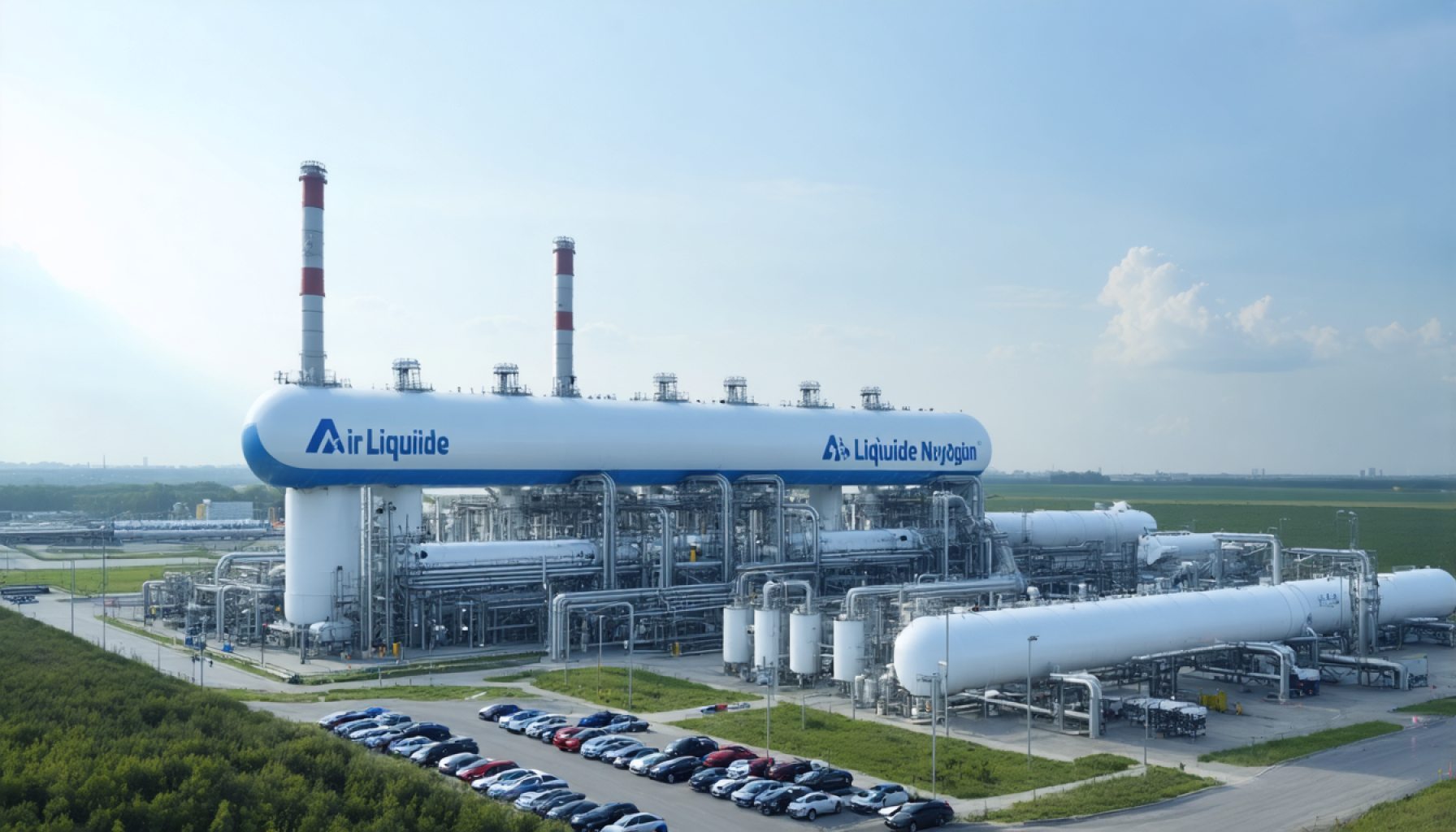- Air Liquide reassesses its U.S. clean hydrogen strategy due to a funding freeze by the current administration.
- Two key projects aim to convert natural gas into hydrogen with reduced carbon emissions, including a collaboration with ExxonMobil in Baytown, Texas.
- The future of hydrogen initiatives hinges on evolving U.S. renewable energy policies.
- CEO François Jackow remains optimistic, focusing on investments in other U.S. sectors like semiconductors and electric vehicles.
- Despite uncertainty, Air Liquide is adapting its strategy to remain resilient, underscoring the importance of innovation and sustainability.
A fog of uncertainty hangs over the ambitious clean hydrogen initiatives in the United States, as Air Liquide, a powerhouse in the industrial gas arena, reassesses its strategy in light of recent political shifts. Originally buoyed by a $7 billion promise for the creation of hydrogen hubs, Air Liquide now faces a murky future after funding was frozen by the current administration.
Yet, hope flickers like a distant flame. Out of six pioneering projects, two hold potential despite the tumult. These endeavors aim to transform natural gas into hydrogen while curbing carbon emissions, presenting a glimmer of progress in the realm of clean energy. In Baytown, Texas, Air Liquide collaborates with ExxonMobil to bring a low-carbon hydrogen and ammonia project to fruition, though its ultimate fate still rests in the balance.
For the other projects, the horizon remains unclear. Their advancement seems tethered to how future policies shape the nation’s renewable energy landscape. Nevertheless, Air Liquide CEO François Jackow remains hopeful, steering a course through rough waters by focusing on robust investments in other U.S. sectors. Here, the company envisions vibrant opportunities, from supplying essential gases to burgeoning semiconductor facilities to supporting the burgeoning electric vehicle industry.
The evolving political landscape might cast doubt on hydrogen’s immediate expansion, but Air Liquide appears resilient, adapting to the winds of change. As it sails through these uncertain seas, the company’s diversified approach serves as a testament to resilience, ensuring it maintains course toward innovation and sustainability. In a world constantly reshaped by policy and innovation, the key lies in agility and foresight.
The Uncertain Voyage of Hydrogen Initiatives in the U.S.: What Lies Ahead?
How-To Steps & Life Hacks: Navigating the Hydrogen Market
To get involved in the hydrogen industry, consider the following steps:
1. Stay Informed: Keep abreast of government policies and funding announcements that impact hydrogen projects.
2. Networking: Connect with industry leaders and experts via conferences and forums, such as the Hydrogen Energy Summit.
3. Investment: Diversify investments across different clean energy projects to mitigate risks associated with policy changes.
Real-World Use Cases
Clean hydrogen can revolutionize multiple sectors:
– Transportation: Hydrogen fuel cells for vehicles provide zero-emission alternatives to conventional engines.
– Industrial Energy: Industries such as metal refining and ammonia production can drastically reduce carbon footprints using hydrogen.
Market Forecasts & Industry Trends
The global hydrogen market is projected to grow significantly, with up to $11 trillion in hydrogen investment needed by 2050 to meet climate goals. Regions investing heavily in hydrogen aim for a multi-gigawatt production capability by 2030.
For more information, explore insights from IEA.
Reviews & Comparisons
There is a growing interest in comparing energy outputs and efficiencies:
– Hydrogen vs. Electric Batteries: While batteries offer high efficiency for short-haul trips, hydrogen is more viable for long-distance and heavy-duty applications due to faster refueling times and longer range.
Controversies & Limitations
Despite its promise, hydrogen faces challenges:
– Infrastructure: The need for infrastructure development, such as refueling stations.
– Cost: Currently, hydrogen production costs can be higher than fossil fuels, though this is expected to decline with scale.
Features, Specs & Pricing
The technology behind hydrogen involves:
– Production: Electrolyzers and steam methane reformers as primary technologies.
– Pricing: The cost per kilogram of hydrogen varies, currently ranging from $6-$8, but projected to fall with technological advancements.
Security & Sustainability
Security involves safe handling, as hydrogen is highly flammable. Sustainability efforts focus on “green hydrogen,” produced via renewable energy sources. Advancement in storage and transport technologies is critical.
Insights & Predictions
Experts suggest that hydrogen could constitute up to 20% of the world’s energy needs. Strategic partnerships and innovations in carbon capture technologies can drive scalability and cost reductions.
Tutorials & Compatibility
To use hydrogen technology, it’s essential to understand system compatibility:
– Equipment: Ensure compatibility of hydrogen storage and fuel cell systems to existing infrastructure.
– Training: Engage in comprehensive safety training for handling hydrogen.
Pros & Cons Overview
Pros:
– Zero emissions
– Versatility in end-use applications
– Significant energy density
Cons:
– High initial costs
– Infrastructure requirements
– Current production relies on fossil fuels
Actionable Recommendations
– Invest in Green Hydrogen: Prioritize participation in green hydrogen projects to capitalize on long-term sustainability.
– Policy Engagement: Advocate for supportive policies that promote clean hydrogen initiatives.
– Collaboration: Engage in cross-industry collaborations to enhance technological innovations.
By staying agile and informed, stakeholders can navigate the uncertain waters of the hydrogen economy confidently. For more industry-related insights, visit U.S. Department of Energy.














